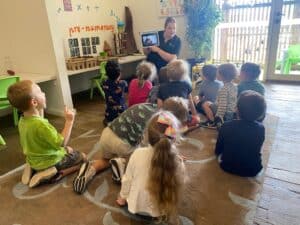As the weather cools and the days get shorter, we enter that precipitous time when screens can become more prevalent in children’s routines. A rainy lunchtime or after-dark dinner preparation throws all the best intentions out the window.
Not to suggest that all screens are the enemy…. A family movie watched together, an intro piano tutorial lesson on iPad or even a basic letter match game on dad’s phone while waiting for the Doctor are all opportunities to bond and nurture the enquiring nature of your little one.
Where we run into trouble is the unsupervised meanderings through games, channels and shows that can plunder the dopamine receptors of our littlie’s brains, often leaving them worse off in mood and temperament than the quiet time had intended.
Sedentary, and note the use of this word, screen time during early childhood can have long-term impacts on a child’s development.
For children younger than five years, there is strong evidence that sedentary screen time has negative effects on weight, motor and cognitive development, social and psychological wellbeing and sleep.
Weight
It is suggested that the impact of childhood weight gain comes through both the increased sedentary behaviour synonymous with screen time and/or through increased ingestion during particularly television viewing.
A notable and well documented piece of research undertaken by Elliott M Blass et al. measured how much Pizza and Mac & Cheese was consumed by a group of people watching television compared to a control group not watching.
The TV viewing group (TVV) not only ate more, but the time between slices of pizza was shorter and the time eating Mac & cheese was longer than the control groups – and not by a small margin! The amount of pizza eaten was 36% more and the M&C a whopping 71%.
This finding suggests the possibility that those who are given opportunities to eat while watching TV may become less sensitive to internal cues to satiety.

We of course as parents/carers can impact these outcomes by offering and serving nutrient dense, colourful and low sugar options on these occasions offsetting some of the health risks inherent in sedentary activities. However, including interactive apps and video games that instruct in mirrored movement and dance can also reduce this causal impact on early childhood health
Motor, cognitive and social development
The Australian Government department of health recommends 3 + hours per day of physical activity for toddlers and pre-schoolers. With cumulative sessions of screentime, this can replace the development opportunities of physical activity and the inherent motor skill milestones that go hand in hand.
At LGH we incorporate many programs to assist our children to meet the department guidelines, from Music & Movement sessions across our centres to our Sport program which brings Playball to all our Kinder Kids*. With sensory and mindfulness activities inherent in daily routines we offset the sedate and quiet nature of pursuits like reading time to ensure all of social, motor and cognitive development milestones are worked towards.
At home this can look like obstacle courses, sand play and even something as simple as playing some tunes, emptying the pot draw and letting your mini rock stars at it! Hand eye coordination in hitting the pots and pincer grip strengthening holding whatever utensil they can find (perhaps steering away from the meat mallet 😉) all assists in achieving these important fine-motor milestones.
Social and psychological wellbeing.
A seemingly increasing number of diagnoses has ADHD in EYL educator’s spotlight. Unfortunately, plenty of research points the finger at screentime, and more distinctly, early years tv shows and game time as a culprit in cases identified in early primary students.
Expert advice based on historic studies suggests that every hour of television viewing per day for under 3’s increases their risk of developing attentional issues later in childhood by 10% – so for 2 hours viewing that’s a 20% increased risk! Conversely and encouragingly, for every hour of cognitive stimulation you provide a child, you reduce their risk of inattention issues by 30% so the odds are in our favour! Reading and singing to them along with trips to the shops, park or zoo are all providing this stimulation.
For more at hand results, a board game, puzzles or a game of eye-spy all hit the spot.

It’s worth also considering the immediate gratification gameplay can have on your child’s developing brain. With evident effect on the dopamine patterns, some games provoke a similar pattern of chemical release in the brain as gambling! The ‘leveling up’, ‘stickers’, ‘new animal litters’ and ‘new outfit options/skins’ all lend themselves to conditioning your child to undertake an action for a reward.
If you do need to pop them on the iPad for a short period (and let’s face it, that’s life these days) do some research on the plentiful educational apps available across the age groups and do so with the peace of mind that you are reducing the potential negative impact of their time.
Sleep
Now sleep may just be the most important reason to limit your child’s screentime.
With unchanging and wide-ranging research all concluding that screentime, particularly before bedtime, impacts negatively on sleep patterns, restricting exposure at this end of the day remains prudent!
For starters, the blue light emanating from iPads and Mobile Phones tricks the brain into thinking it’s still daylight. It stimulates a part of the brain that coordinates sleep cycles, suppressing the production of melatonin and making it super difficult to ‘switch off’ your brain to get some shut eye. Many recommendations suggests that Screen Time of any kind less than 30 minutes before bed time has a negative impact on sleep, both duration and quality. Show me a parent who wants a toddler with less sleep!

So, the long and the short of it is, YES, screentime in all its guises can have a negative impact on early childhood development and will if viewed in the evening prior to bed time. But, all screentime isn’t created equal….Look for games that encourage dance and movement, apps and television shows that are low stimulation and learning based and best of all, counter any screentime with some cognitively rewarding opportunities, whether it’s heading into the backyard to check out the cloud shapes, playing a game of Simon Says or snuggling down with a picture book. Keep in mind that 1 hour of these activities reduces the risk of attention issues in Primary school 3 x times more than the screentime increases them.
At Little Grasshoppers our children, even those attending one day a week, are exposed to social and motor development opportunities on a daily basis. We do incorporate screens on occasion – these are of course the technological generation – but in a supporting and non-sedentary fashion…
Sharing songs or identifying different instruments in our Music & Movement Program or to source different dinosaur types and skeletons alongside a STEM incursion.

We can’t demonise these very items that we’ve come to be dependent on so very quickly. Instead, furnished with some knowledge and alternatives, we can ensure that our children’s early years see them flourish with their sparing use.
*Commencing Term 3, 2023
